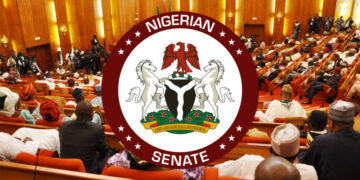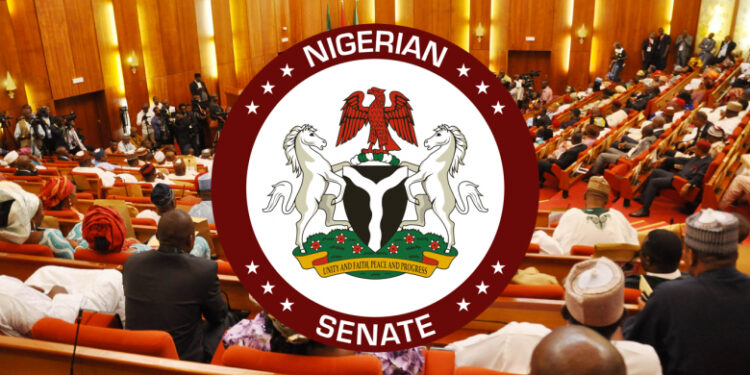By John Ikani
A new Electoral Act Amendment Bill which provides for total ban of electronic transmission of votes is to be introduced at the Senate next Tuesday.
The provision forms part of the 121-page document to be laid before the upper legislative chamber at plenary by the Chairman of the Senate Committee on Independent National Electoral Commission (INEC), Senator Kabir Gaya.
The proposed piece of legislation is titled “A Bill for an Act to repeal the Electoral Act No 6, 2010 and enact the Electoral Act 2021, to regulate the conduct of Federal, State and Area Councils in the Federal Capital Territory elections, and for related matters”.
But this current draft, which is said to be at variance with what was earlier agreed to by the committees of the two chambers of the legislature, newsmen gathered, might result in a showdown amongst the lawmakers, when the draft is tabled for debate this week.
This is as the Senate Committee chaired by Senator Kabiru Gaya was said to have concluded plans to clear Ms. Laureate Onochie as an INEC national commissioner.
The bill, which has 153 sections, is divided into eight parts including Establishment and function, etc of INEC, Staff of the Commission, National register of Voters and Voters’ education and procedure at election.
Other parts of the bill are political parties, Electoral Offences, determination of election petitions arising from election petitions and Miscellaneous.
The draft bill, a copy of which was sighted by newsmen, allowed for electronic voting by secret ballot but ruled out electronic transmission of the votes cast at the poling units.
This is contained on Page 25 of the document and subtitled procedure at election under Section 50(2) of bill which states: “Voting at an election under this bill shall be in accordance with the procedure determined by the Commission (INEC) which may include electronic voting provided that the Commission shall not transmit results of election by electronic means”.
According to section. 50 (2) of the new draft, “Voting at an election under this Bill shall be in accordance with the procedure determined by the Commission, which may include electronic voting, PROVIDED that the Commission shall not transmit results of election by electronic means”.
The draft bill further stated that, “Voting at an election under this Bill shall be by open secret ballot” and that “A voter on receiving a ballot paper shall mark it in the manner prescribed by the Commission.
“All ballots at an election under this Bill at any polling station shall be deposited in the ballot box in the open view of the public.
“No voter shall vote for more than one candidate or record more than one vote in favour of any candidate at any one election. (2)Where the number of votes cast at an election in any polling unit exceeds the number of accredited voters in that polling unit, the Presiding Officer shall cancel the result of the election in that polling unit.
“Where the result of an election is cancelled in accordance with subsection (2), there shall be no return for the election until another poll has taken place in the affected polling unit.(4)Notwithstanding the provisions of subsections (2) and (3), the Commission may, if satisfied that the result of the election will not substantially be affected by voting in the area where the election is cancelled, direct that a return of the election be made.
“Where a voter makes any writing or mark on a ballot paper by which he or she may be identified, such ballot paper shall be rejected provided that any print resulting from the staining of the thumb of the voter in the voting compartment shall not be or be deemed to be a mark of identification under this section.
“The Commission shall use indelible ink for any thumb mark by voters on ballot papers”, the draft bill stated.
Findings revealed that this clause was sneaked into the draft bill by some leaders of the legislature without the knowledge of the committee members.
A ranking Senator and member of the Senate committee on INEC, upon enquiry, told THISDAY that at no time was that provision discussed at the committee level talk less of inserting it in the draft bill.
The Senator, who spoke on condition of anonymity said, he now understood why the delay in presenting the bill after the committee had long concluded its work.
His words: “This is not funny at all. I now know why the presentation of the report had been delayed this long after we finished our work at the committee level. They have been playing hide and seek on the matter.
“For all I know and other committee members can bear me witness, the issue of ban on electronic transfer of votes was not part of the report we wrote. So, that means the committee Chairman is culpable and owes the committee members an explanation over the strange insertion”.
The bill, which has been in the works for some time would be laid before the Senate next Tuesday by Chairman of the Senate Committee on INEC, Senator Gaya.
Newsmen learnt that the bill would then be scheduled for debate on Wednesday with the former governor of Kano State and committee Chairman, Senator Gaya, leading the debate by summarising the provisions of the bill.
However, the bill may run into crisis as there are plans by some Senators especially, members of the Senate Committee on INEC to oppose the strange clause included in the draft.
Newsmen gathered at the weekend that the Senators had already begun to reach out to their colleagues, explaining that they were not part of the inserted clause.
They have, therefore, pledged to resist the clause banning electronic transmission of votes cast during the general debate of the bill this Wednesday.
In a related development, despite the protests against the person of Ms Onochie, the source claimed the Senator Gaya-led committee has concluded plans to approve her appointment as an INEC national commissioner.




































